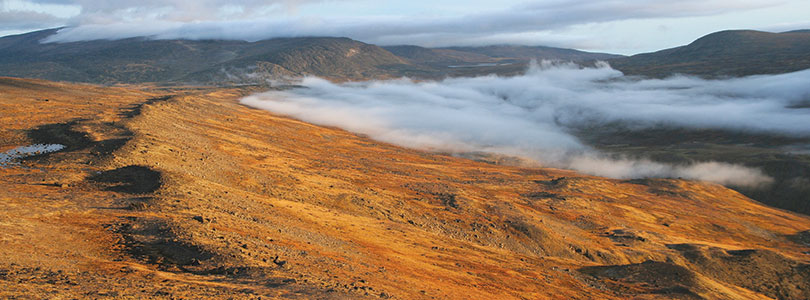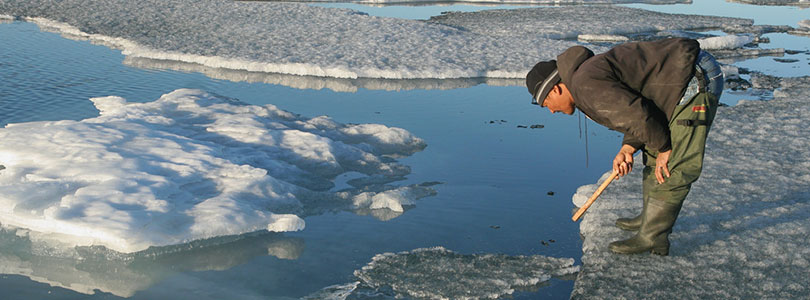


UQAR is dedicated to the study of the Far North and cold lower latitudes, a field known as “nordicity.” This research area brings together a diversity of researchers with a multidisciplinary interest in northern environments around a number of highly complementary disciplines.
This approach fosters a positive resolution to the challenges facing the North in the context of socio-economic development and accelerated environmental changes.
Diversity of nordicity-related research fields
Biology, chemistry, and geography
Research at the Biology, Chemistry, and Geography Department (in French) is aimed at better understanding the processes of environments in cold climates in order to respond to major conservation and sustainable management challenges. It helps to determine a state of reference for the northern environments and their changing dynamics.
In particular, research allows to measure and mitigate environmental risks, propose environmental protection, adaptation, restoration, and conservation measures, as well as to contribute to forestry and wildlife resource development. Among the key issues addressed are the evolution of northern continental environments in a global change context and the relationships between northern environments and human societies. This makes UQAR an international leader on the issue.
Teams of biologists and chemists study, among other things, the exploitation of marine biomolecules, aquatic environment pollution, ocean acidification and the impact of climate change on marine environments, fish ecophysiology, aquaculture, and seabirds.
Researchers in geography focus on natural hazards, shoreline erosion, coastal geomorphology, marine remote sensing, integrated coastal area management, river dynamics and sediment transport, as well as on the biogeochemistry of intertidal and coastal systems.
Marine sciences
The Institut des sciences de la mer de Rimouski (Marine science institute, in French) enjoys international recognition as the flagship of Quebec research.
Located on the Rimouski campus, the institute has cutting-edge infrastructure and it brings together a critical mass of researchers and students of various disciplines with an interest in the functioning of northern marine systems, including the Arctic Ocean, in terms of climate change, the impact of human activity on ecosystems, exploitation of marine bioresources, marine geology, and natural hazards.
In particular, this expertise contributes to the development of the knowledge needed to tackle the major maritime issues of the North.
Regional development
Regional development researchers (in French) and students analyze the socioterritorial dynamics in Quebec, including the North, and create development assistance tools. Focus is placed on the effects of development policies on the regional economy, the social acceptability of natural resource exploitation projects, and local community adaptation to climate change.
Health sciences
Health research at UQAR (in French) is characterized by a multidisciplinary approach to the study of healthcare in rural areas, including northern regions, both in regards to care and services and to the populations concerned, mainly vulnerable groups.
The Department of Nursing acts as a catalyst for collaboration with actors in the areas of social work, psychoeducation, management, regional development, and biology, to name only a few.
Engineering
UQAR’s expertise in engineering is focused in a number of areas related to mechanical and electrical engineering, allowing for the implementation of a range of projects, such as identification and exploitation of wind power energy potential in northern environments, including technological innovation ensuring optimal energy management of the equipment used in resource exploitation.
Cutting-edge research units
The success of northern research at UQAR is supported by a number of research units, making the university a key player in the field. This area of excellence brings together a community of researchers representing various disciplinary backgrounds from UQAR and other associated institutions.
Highly specialized research infrastructure
UQAR has cutting-edge infrastructure that offers researchers unique research potential. Over the past decade, more than $50M have been invested in infrastructure, including equipment, to support research focusing on nordicity.
Oceanographic research vessel Coriolis II
In addition to high-performance oceanographic instruments, UQAR has a 50m-long state-of-the-art oceanographic research vessel, equipped with the latest technological innovations.
Coriolis II is a genuine floating laboratory with space devoted exclusively to research work. These laboratories make it possible to form multidisciplinary research teams of up to 14 scientists, aside from the ship’s regular crew. It meets the highest standards of maritime certification and can navigate throughout the world. It was used to carry out the MARES and MARGES missions for Argentina in the Gulf of San Jorge.
Research stations
For the purpose of its activities within the Northen Studies Center, UQAR has a research station based in Radisson that can host up to 20 researchers.
UQAR hasalso mobile automated weather stations that can be moved anywhere. They are used for assessing the long-term impacts of climate change and forestland disturbances (silviculture, windfall, and others) on the water regime and nutrient cycling, and coastal erosion, for example.
Environmental simulators
Climate chambers in cold environments, unique in Canada, make it possible to study a number of mechanisms that enable birds to adjust to environment-related energy constraints under controlled or semi-natural conditions (for example, hormonal regulation of heat production, morphological and behavioural changes, and nutrition). These infrastructures also enable the study of birds’ capacity to adjust to climate disruptions resulting from global warming.
In the maritime field, mesocosms are non-modified components of ecosystems taken from the natural environment, placed in a laboratory, and maintained in a controlled environment (temperature, salinity, organic matter, and so on) in order to conduct various studies (hypoxia simulation, addition of contaminants, temperature increase, and variation in the quantity of organic matter, for example).
Centre for Innovation Support through Research
UQAR possesses a building comprising laboratory space for chemistry, biology, and oceanography research. The mission of the Centre for Innovation Support through Research (CAIR) is to support business and organization innovation, in particular small and medium-sized enterprises, by promoting and facilitating access to UQAR’s expertise and cutting-edge equipment.
Examples of state-of-the-art laboratories
- Community ecology laboratory
- Dynamique et de gestion intégrée des zonescôtières (coastal areas dynamics and integrated management laboratory)
- Géomorphologie et dynamique fluviale (geomorphology and river dynamics laboratory)
- Laboratoire de recherche en énergie éolienne (wind energy research laboratory)
- Simulations et analyses des systèmes océaniques (ocean system simulation and analyses laboratory)
- Paléomagnétisme sédimentaire et géologie marine (paleomagnetism of sediments and marine geology laboratory)
- Laboratoire de recherche en productique (research laboratory on computer integrated manufacturing)
- Analyse des particules et des surfaces (particle and surface analysis laboratory)
Undergraduate and graduate study programs with a focus on northern issues
Graduate programs
The University of Quebec at Rimouski (UQAR) is a French-language public university. The links of the programs listed below lead to pages in French.
The main academic objective of this research focus is to train scientists capable of overcoming the major challenges of the 21st century and to contribute to the sustainable development of northern regions. The following master’s and doctoral level programs are associated with the area of excellence in nordicity.
Biology
- Diploma of Higher Specialized Studies in wildlife management
- Master’s in wildlife habitat management (research profile)
- PhD in biology
Geography
- Diploma of Higher Specialized Studies in natural hazard analysis and prevention
- Master’s in geography (with a thesis)
- PhD in environmental sciences
Oceanography
- Diploma of Higher Specialized Studies in applied oceanography
- Master’s in oceanography
- PhD in oceanography
Regional development
- Diploma of Higher Specialized Studies in regional and territorial development
- Master’s in regional development
- PhD in regional development
Engineering
- Master’s-level short program in electrical engineering
- Master’s-level short program in electromechanical engineering
- Master’s-level short program in mechanical engineering
- Diploma of Higher Specialized Studies in engineering (coursework)
- Diploma of Higher Specialized Studies in engineering (project)
- Master’s in engineering
- Master’s in engineering (coursework and project)
- PhD in engineering
Undergraduate programs
The University of Quebec at Rimouski (UQAR) is a French-language public university. The links of the programs listed below lead to pages in French.
At the undergraduate level, the following programs, involving associate researchers affiliated with the area of research excellence in nordicity, constitute an entry opportunity for students looking to pursue graduate studies in this area.
Biology
Chemistry
Geography
- Undergraduate short program in environment, geomorphology, and natural hazards
- Minor in geography
- Major in geography
- Bachelor’s in geography (with a major in marine environment)
Regional development
Other programs
The Université d'été en phénologie des processus d’écosystème (Summer university on phenology of ecosystem processes) is a seven-day intensive course addressing the concepts, methods, and issues relating to the study of phenology of ecosystem processes. It includes class and laboratory activities, as well as field activities in Parc national de la Gaspésie.
The Stage en biogéographie côtière, montagnarde et alpine (Internship in coastal, mountain, and alpine biogeography) offers a six-day intensive multidisciplinary training with a practical focus on concepts, methods, and issues of numerous sub-disciplines of biology (land use, ecology, conservation, and habitat management, for example) and geography (such as geomorphology, hazard management, river dynamics, and river-basin dynamics).
Offered on an alternating basis in Gaspésie and on the North Shore, the Stage en géographique de l’Est du Québec (internship in eastern Quebec geography) provides theoretical and practical training covering the main natural hazards affecting the territory of eastern Quebec. It enables students and professionals of geography, environmental sciences, and earth sciences to gain new expertise in natural hazard management and prevention through cutting-edge technology field methods and tools.
Key Facts
Approximately 41% of annual research funding at UQAR is dedicated to nordicity
Over 775 research projects have been carried out over the last five years
| 22% faculty resources 26% research units 4 Bachelor’s programs 4 Master’s programs 4 PhD programs 2 training programs (EnviroNord) Over 300 students per yeare |